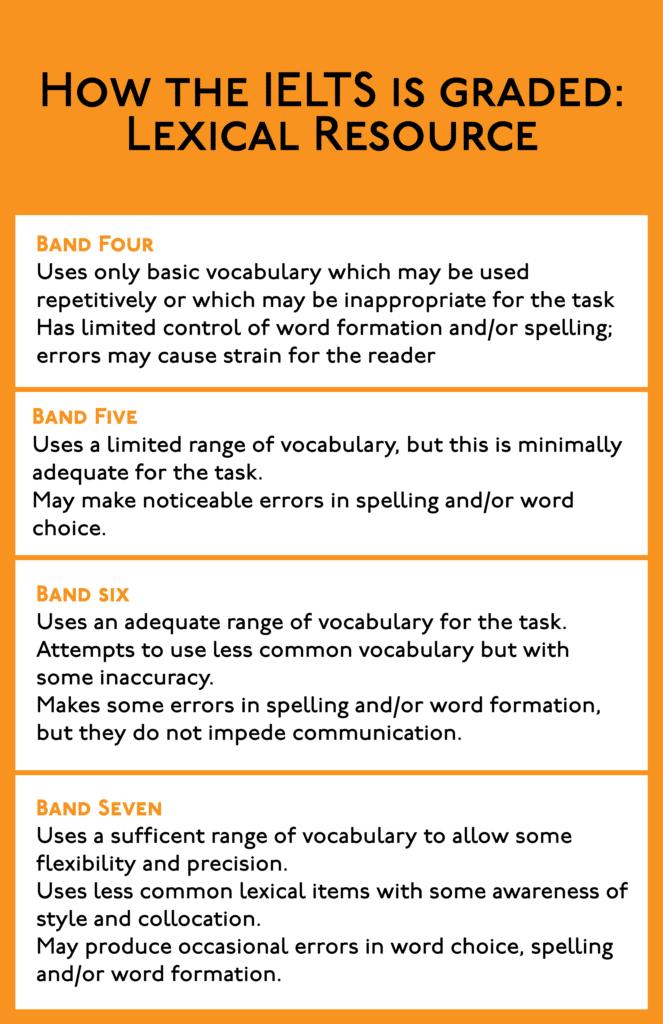What is lexical resource?

The first thing the examiners are looking for in task response is a wide range of vocabulary. The band descriptors ask for ‘flexibility and precision’ at higher levels and this means that you should use words that are more specific. An illustrative example of this might be describing a meal. If I say I had a meal that was ‘good’, it doesn’t give you much information about what that meal was actually like. However, if I say a meal was ‘spicy’, ‘earthy’, or ‘refined’, you have a much better idea of what it was like. Another aspect of vocabulary range is making sure you don’t overuse words. Obviously common words like ‘the’ don’t apply here, but if you find yourself using the same word too frequently, you should look for a synonym (a word with the same meaning).
Next, we need to pay attention to errors in usage. Errors can take the form of spelling errors, word formation errors or word choice errors. A word formation error means using the wrong form of a word. For example, writing ‘I swim good’ instead of ‘I swim well’. A word choice error is more about using a word that isn’t suitable or typically used, for example, ‘I fired a candle’.
The final thing to pay attention to, especially if your goal is a band 7 or above, is collocation. Collocation describes words that ‘go together’ in a language. A famous example of this is that in English, we almost always say ‘it rained heavily’ not ‘it rained strongly’. There’s no reason for this except that people say ‘it rained heavily’ so often that other people have learned it by copying them. The best way to learn collocation is to expose yourself to as much English as possible, this might be through books, TV shows, movies, podcasts or real life conversations. It doesn’t matter where this exposure to English comes from too much; it’s more important that you pick something you enjoy so you can build a good habit.
what are some common lexical resource mistakes?
Using rare words for the sake of it
One issue I’ve seen over and over again is that students want to use uncommon words rather than wanting to use more specific words. Above I said that ‘spicy’ is more specific than ‘good’ for describing a meal but what if I said ‘piquant’ instead of spicy? ‘Piquant’ is another word that means ‘spicy’ but is less commonly used. Students might think that it’s better for the IELTS to describe a food as ‘piquant’ and not ‘spicy’ because it is a ‘rarer’ or ‘more advanced’ word. However, these two words are equally specific so ‘piquant’ isn’t better than ‘spicy’. If anything ‘piquant’ sounds a little strange because it’s so rare.
Memorising word lists
Another mistake learners make is that they often love to memorise word lists. While this is better than doing nothing, it’s a really ineffective way of learning words. One reason for this is that people are better at memorising things that are meaningful for them. However, when you read a word list, it’s fairly meaningless. Another reason is that even when you can remember what a word means, that doesn’t mean you can use it effectively in a sentence. Learners who do this might end up using a word in a way that sounds very out of place and this can negatively impact their task response score. A much better way of learning new words is to get as much exposure to English as possible as I’ve described above.
Using idioms or sayings
The last mistake students make is using idioms and sayings in the IELTS writing exam. An idiom is a phrase where the meaning does not match the meaning of the words. Examples of idioms include ‘it’s my cup of tea’, ‘it’s raining cats and dogs’ and or ‘I smell a rat’. These mean ‘I like it’, ‘it’s raining heavily’ and ‘something seems suspicious’ but if you didn’t know the meanings of these, you’d struggle to work it out from the words themselves. A saying is an expression that offers some common wisdom such as ‘actions speak louder than words’, ‘better late than never’ or ‘time is money’. Both of these aren’t really appropriate for academic writing and won’t improve your lexical resource score.